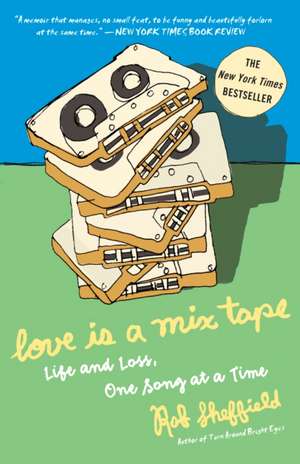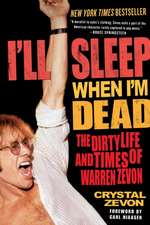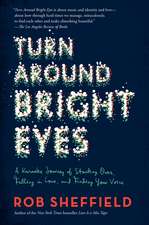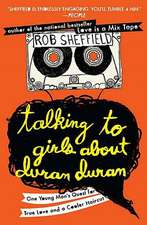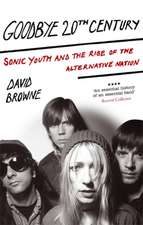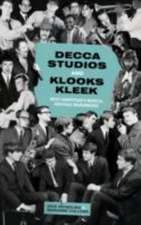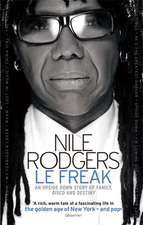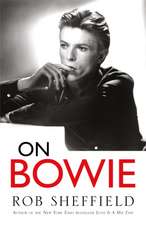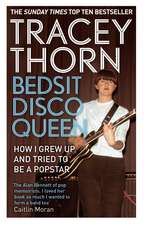Love Is a Mix Tape: Life and Loss, One Song at a Time
Autor Rob Sheffielden Limba Engleză Paperback – 30 noi 2007
Vezi toate premiile Carte premiată
Quill Awards (2007)
in his arms. Using the listings of fifteen of his favorite mix tapes, Rob shows that the power of music to build a bridge between people is stronger than death. You’ll read these words, perhaps surprisingly, with joy in your heart and a song in your head—the one that comes to mind when you think of the love of your life.
| Toate formatele și edițiile | Preț | Express |
|---|---|---|
| Paperback (2) | 51.82 lei 3-5 săpt. | +24.21 lei 4-10 zile |
| Little Brown Book Group – 3 mar 2010 | 51.82 lei 3-5 săpt. | +24.21 lei 4-10 zile |
| Three Rivers Press (CA) – 30 noi 2007 | 84.12 lei 3-5 săpt. | +14.19 lei 4-10 zile |
Preț: 84.12 lei
Nou
Puncte Express: 126
Preț estimativ în valută:
16.10€ • 16.85$ • 13.40£
16.10€ • 16.85$ • 13.40£
Carte disponibilă
Livrare economică 10-24 martie
Livrare express 21-27 februarie pentru 24.18 lei
Preluare comenzi: 021 569.72.76
Specificații
ISBN-13: 9781400083039
ISBN-10: 1400083036
Pagini: 224
Dimensiuni: 132 x 201 x 15 mm
Greutate: 0.18 kg
Editura: Three Rivers Press (CA)
ISBN-10: 1400083036
Pagini: 224
Dimensiuni: 132 x 201 x 15 mm
Greutate: 0.18 kg
Editura: Three Rivers Press (CA)
Notă biografică
ROB SHEFFIELD is a contributing editor at Rolling Stone. He has been a rock critic and pop culture journalist for fifteen years, and has appeared on various MTV and VH1 shows. He lives in Brooklyn.
From the Hardcover edition.
From the Hardcover edition.
Extras
BIG STAR: FOR RENÉE
October, 1989
Side One
Big Star: *Sister Lovers*
plus
The Bats: “Sir Queen”
Velvet Underground: “Radio Ad”
Side Two
Big Star: *Radio City”
plus
Lucinda Williams: “I Just Wanted To See You So Bad”
The Raincoats: “Only Loved At Night”
Marti Jones: “Lonely Is As Lonely Does”
As far as mix tapes go, *Big Star: For Renée* is totally unimaginative. It’s basically just one complete album on each side of a tape. But this is the tape that changed everything. Everything in my life comes directly from this Maxell XLII crush tape, made on October 10, 1989, for Renée.
Renée and I met at a bar called the Eastern Standard in Charlottesville, Virginia. I had just moved there to study English in grad school. Renée was a fiction writer in the MFA program. I was sitting with my poet friend Chris in a table in the back, when I fell under the spell of Renée’s bourbon-baked voice. The bartender put on Big Star’s Radio City. Renée was the only other person in the room who perked up. We started talking about how much we loved Big Star. It turned out we had the same favorite Big Star song - the acoustic ballad Thirteen. She’d never heard their third album, Sister Lovers. So naturally, I told her the same thing I’d told every other woman I’d ever fallen for: “I’ll make you a tape!”
As Renée left the bar, I asked my friend, “What was that girl’s name again?”
“Renée.”
“She’s really beautiful.”
“Uh huh. And there’s her boyfriend.”
The boyfriend’s name was Jimm, and he really did spell his name with two M’s, a dealbreaker if I ever heard one. Renée had actually just broken up with the guy that night, but I didn’t know that yet. So I just cursed my luck, and crushed out on her from afar. I memorized her teaching schedule, and hung around the English department whenever she had office hours, hoping to run into her in the hallway. I wrote poems about her. I made her this tape, and slipped it into her mailbox. I just taped my two favorite Big Star albums, and filled up the spaces at the end of the tape with other songs I liked, hoping it would impress her. How cool was this girl? She was an Appalachian country girl from southwestern Virginia, Pulaski County. She had big curly brown hair, little round glasses, a girlish drawl. I just knew her favorite Go-Go was Jane Wiedlin.
One Saturday night we met at a party and danced to a few B-52’s songs. Like all Southern girls, Renée had an intense relationship with the first three B-52’s albums. “All girls are either Kate girls or Cindy girls,” she told me. “Like how boys are either Beatles or Stones boys. You like them both, but there’s only one who’s totally yours.” Her B-52 idol was Kate, the brunette with the auburn melancholy in her voice. I wanted to stay all night and keep talking to Renée about the B-52s, but my ride wanted to go early. So I left her stranded and went home to pace up and down the parking lot outside the subdivision, shivering in the cold with my Walkman, listening to Prince’s “Little Red Corvette.” The ache in his voice summed up my mood, as Prince sang about a girl driving right past him, the kind of car that doesn’t pass you every day.
Renée and I ran into each other again when the poet John Ashbery came to town for a reading. He was one of my idols, the man who wrote *The Double Dream of Spring*. I got to meet him after the reading, but I blew it. A bunch of us were hovering around, trying to think of clever things to say. He’d just read his poem “The Songs We Know Best,” and was explaining that he’d written it to go with the melody of Peaches and Herb’s “Reunited,” because the song was all over the radio and he couldn’t get the tune out of his head. So I asked if he was a fan of Wham!’s “Last Christmas,” which of course has the same melody as “Reunited.” He smiled graciously and said, no, he hadn’t, but he liked George Michael. Then he went back to saying nothing at all and my friends were furious and I was mortified and I will go to my grave wondering why I spent my one moment in the presence of this great man discussing Wham! (and not even a good Wham! song) but I guess that’s the double dream of dipshit I am.
Afterwards I stood at the bar, drowning my sorrows. Renée came up to kick my shins and bum a cigarette. She mentioned that her birthday was coming up in a few days. As always, there were a few other boys from her fan club hovering around, so we all went out for a late-night tour of Charlottesville’s cheaper drinking establishments. I squeezed into a booth next to her and we talked about music. She told me you can sing the *Beverly Hillbillies* theme to the tune of R.E.M.’s “Talk About The Passion.” That was it, basically; and as soon as she started to sing “Talk About The Clamppetts,” any thought I had of not falling in love with her went down in some serious Towering Inferno flames. It was over. I was over.
We hung out again the next night--Renée showed up with another gang of suitor boys, all giving her puppy dog looks, but I wasn’t too worried about outlasting them. Joe passed out around midnight. Paul staggered out a few minutes later. Steve’s offer to help walk Renée home lasted as long as it took for him to smash into the wall twice on his way down the stairs. I was the last man standing. Renée led me to her place, a couple of miles away. It was so dark I couldn’t see her at all while we walked; I just followed her voice. I spent the night on her couch, sleeping under a huge portrait of her painted by some sweet indie-rock boy back in Roanoke. I was a little sad about being on the couch, but I was going for the long bomb. Her incredibly annoying cat, Molly, kept jumping on my face all night. I woke up at dawn and lay there drowsing, feeling a little less lonely than I had the morning before, waiting for this girl to make some noise.
Renée had Saturday errands to run, and I invited myself along to keep her company. We drove all around Charlottesville in the afternoon sun. We listened to a mix tape another guy had made her, back in Roanoke. It had some lame indie rock, some decent indie rock, and one really great song: Flatt and Scruggs doing their bluegrass version of “Ode To Billie Joe.” She told me she’d thrown a Billie Joe party that summer. “I had it on the third of June,” she crowed. “You know, the day the song takes place. I served all the food they eat in the song: black-eyed peas, biscuits, apple pie.”
We couldn’t think of anything else to talk about, so we just drove in silence until she dropped me off at my place. I spent the rest of the day making a birthday tape for her, mostly Senegalese acoustic music by Baaba Maal and Mansour Seck, just in case she smoked pot. I started to add Bob Dylan’s “I Want You,” but then thought better of it. Instead, I added Scrawl’s “Breaker Breaker,” to show off my affinity with feminist trucker punk songs, and the Neville Brothers, to make her think maybe I smoked pot.
We met up at a dive called the Garrett on Monday, the night before her birthday. It was not a romantic bar--the carpet was so pot-soaked you got a buzz walking to the bathroom--but it offered privacy, cheap liquor, a cigarette machine that was easy to tilt, and pool tables to distract pain-in-the-ass innocent bystanders. I’d spent the day writing a sonnet sequence for her. I’m not sure what I was thinking--I mean, I used the word “catachresis” in the first line. But I was certain my prosodic ingenuity would melt her heart for good. I used one of my favorite rhyme schemes, stolen from the James Merrill poem “The Octopus,” though he stole it himself, from W.H. Auden’s The Sea and the Mirror, rhyming the first syllable of a trochee with the final syllable in the next line. How could she resist?
At midnight, I gave her the poems.
“What’s going on?” she asked.
“Well, the last word in the first line is a trochee, and it rhymes with the end of the next line. So ‘catachresis’ rhymes with ‘fleece.’”
“No, what’s going on?”
“In a catachresis?”
“No. What are you talking about?”
“Uh…I have a big crush on you.”
“Oooooh,” she said. She smiled and let the pages drop on the table. She relaxed in front of my eyes. “So how did it start?”
“Well, I think you’re really beautiful.”
She relaxed a lot more--in fact, her face changed shape a little, got a little more round, as if her jaw unclenched. I didn’t know whether that was a good sign or not, but I couldn’t shut up yet.
“I always thought so. Right away, when I saw you.”
“The amazing black dress,” she nodded. “I was wearing that when I met you. There’s, uh, a lot of *me* in that dress. My Fuck the Hostess dress. It’s a real ‘drop to your knees and say amen’ dress.”
“I noticed. It’s gotten worse since then.”
“I know.” She lit one of my Dunhills. I had never seen her so comfortable. “I was on the phone with my friend Merit tonight, and she was like, Does Rob like you? And I said, I don’t know, he made me a tape and he didn’t call and then we danced together and then he left and called and left a message but didn’t call after that. Merit was like, So do you like Rob?”
I couldn’t believe she was making me do this. “So do you?”
She smiled. “I don’t know. He’s not my type, but I really like him.” She told me her type was farm boys with broad shoulders, football players. She took her time smoking that cigarette. She still had most of her beer left and she was in no hurry at all. I was too scared to talk but I was more scared to not talk.
“I don’t know what your type is. I don’t know what your deal is. I don’t even know if you have a boyfriend. I know I like you and I want to be in your life, that’s it, and if you have any room for a boyfriend, I would like to be your boyfriend, and if you don’t have any room, I would like to be your friend. Any room you have for me in your life is great. If you would like me to start out in one room and move to another, I could do that.”
“But you’d rather be a boyfriend than a friend?”
“Given the choice. No, not given the choice. That’s what I want.”
“Where are you parked?”
“I walked.”
“What’s a catachresis?”
“A rhetorical inversion of tense, kind of like a transumption. Let’s go.”
In her car, we listened to Marshall Crenshaw’s first album, and when we got to her place, we sat on the couch under that big painting. She was not comfortable any more; she was really scared. She got up and put on my Big Star mix, then took it off. She put on Marshall Crenshaw again. I went through her shoeboxes of tapes. This girl was definitely an eighties girl. She had one tape with REM’s Murmur on one side and U2’s War on the other, another with The Velvet Underground And Nico backed with Moondance. Uh oh, she also had a lot of XTC tapes. We’d have to work that out later.
“Oh, Rob,” she said. “I’m really scared.”
I was scared too. That was a long, long night. I swear her face changed shape several times. I don’t know how this is possible, but it did. Her eyelids got heavier and wider. Her breathing got slower and deeper, and her jaw kept dropping lower, making her whole face bigger. She had a solemn look in her eyes. Around dawn, she said, “I hope I do right by you.” I didn’t know what she meant, so I didn’t say anything. I was wearing my Husker Du t-shirt from the *Warehouse* tour. She was wearing a Bob Jones University sweatshirt. I figured there must be a disturbing story there, but I didn’t ask.
Sometimes you lie in a strange room, in a strange person’s home, and you feel yourself bending out of shape. Melting, touching something hot, something that warps you in drastic and probably irreversible ways you won’t get to take stock of until it’s too late. I felt myself just melting in Renée’s room that night. I remembered being a kid, standing on the bridge over the Pine Tree Brook, when we would find a wax six-ring holder from a six-pack the older kids had killed. We would touch a match to one corner, hold it over the water, and just watch it drip, drip, drip. We’d watch the circular rings, long before the flame even touched them, curl up or bend over in agony. The circles turn into writhing squiggles, and they’ll never be circles again. Six rings of wax, twisting and contorting permanently, doing a spastic death dance like the one Christopher Lee does at the end in Horror Of Dracula when the sunlight hits him.
The minutes dripped by, each one totally bending and twisting my shape. We stopped getting up to flip the tape, and just listened to dead air. I could feel serious changes happening to me the longer I stayed in Renée’s room. I felt knots untie themselves, knots I didn’t know were there. I could already tell there were things happening deep inside me that were irreversible. Is there any scarier word than “irreversible”? It’s a hiss of a word, full of side effects and mutilations. Severe tire damage--no backing up. Falling in love with Renée felt that way. I felt strange things going on inside me, and I knew that these weren’t things I would recover from. These were changes that were shaping the way things were going to be, and I wouldn’t find out how until later. Irreversible. I remembering that we discussed The Towering Inferno that night, the scene with Steve McQueen, the valiant firefighter, and William Holden, the evil tycoon who owns the hotel. William Holden asks, “How bad is it?” and Steve McQueen answers, “It’s a fire, mister. And all fires are bad!” That’s the last thing I remember before I fell asleep.
From the Hardcover edition.
October, 1989
Side One
Big Star: *Sister Lovers*
plus
The Bats: “Sir Queen”
Velvet Underground: “Radio Ad”
Side Two
Big Star: *Radio City”
plus
Lucinda Williams: “I Just Wanted To See You So Bad”
The Raincoats: “Only Loved At Night”
Marti Jones: “Lonely Is As Lonely Does”
As far as mix tapes go, *Big Star: For Renée* is totally unimaginative. It’s basically just one complete album on each side of a tape. But this is the tape that changed everything. Everything in my life comes directly from this Maxell XLII crush tape, made on October 10, 1989, for Renée.
Renée and I met at a bar called the Eastern Standard in Charlottesville, Virginia. I had just moved there to study English in grad school. Renée was a fiction writer in the MFA program. I was sitting with my poet friend Chris in a table in the back, when I fell under the spell of Renée’s bourbon-baked voice. The bartender put on Big Star’s Radio City. Renée was the only other person in the room who perked up. We started talking about how much we loved Big Star. It turned out we had the same favorite Big Star song - the acoustic ballad Thirteen. She’d never heard their third album, Sister Lovers. So naturally, I told her the same thing I’d told every other woman I’d ever fallen for: “I’ll make you a tape!”
As Renée left the bar, I asked my friend, “What was that girl’s name again?”
“Renée.”
“She’s really beautiful.”
“Uh huh. And there’s her boyfriend.”
The boyfriend’s name was Jimm, and he really did spell his name with two M’s, a dealbreaker if I ever heard one. Renée had actually just broken up with the guy that night, but I didn’t know that yet. So I just cursed my luck, and crushed out on her from afar. I memorized her teaching schedule, and hung around the English department whenever she had office hours, hoping to run into her in the hallway. I wrote poems about her. I made her this tape, and slipped it into her mailbox. I just taped my two favorite Big Star albums, and filled up the spaces at the end of the tape with other songs I liked, hoping it would impress her. How cool was this girl? She was an Appalachian country girl from southwestern Virginia, Pulaski County. She had big curly brown hair, little round glasses, a girlish drawl. I just knew her favorite Go-Go was Jane Wiedlin.
One Saturday night we met at a party and danced to a few B-52’s songs. Like all Southern girls, Renée had an intense relationship with the first three B-52’s albums. “All girls are either Kate girls or Cindy girls,” she told me. “Like how boys are either Beatles or Stones boys. You like them both, but there’s only one who’s totally yours.” Her B-52 idol was Kate, the brunette with the auburn melancholy in her voice. I wanted to stay all night and keep talking to Renée about the B-52s, but my ride wanted to go early. So I left her stranded and went home to pace up and down the parking lot outside the subdivision, shivering in the cold with my Walkman, listening to Prince’s “Little Red Corvette.” The ache in his voice summed up my mood, as Prince sang about a girl driving right past him, the kind of car that doesn’t pass you every day.
Renée and I ran into each other again when the poet John Ashbery came to town for a reading. He was one of my idols, the man who wrote *The Double Dream of Spring*. I got to meet him after the reading, but I blew it. A bunch of us were hovering around, trying to think of clever things to say. He’d just read his poem “The Songs We Know Best,” and was explaining that he’d written it to go with the melody of Peaches and Herb’s “Reunited,” because the song was all over the radio and he couldn’t get the tune out of his head. So I asked if he was a fan of Wham!’s “Last Christmas,” which of course has the same melody as “Reunited.” He smiled graciously and said, no, he hadn’t, but he liked George Michael. Then he went back to saying nothing at all and my friends were furious and I was mortified and I will go to my grave wondering why I spent my one moment in the presence of this great man discussing Wham! (and not even a good Wham! song) but I guess that’s the double dream of dipshit I am.
Afterwards I stood at the bar, drowning my sorrows. Renée came up to kick my shins and bum a cigarette. She mentioned that her birthday was coming up in a few days. As always, there were a few other boys from her fan club hovering around, so we all went out for a late-night tour of Charlottesville’s cheaper drinking establishments. I squeezed into a booth next to her and we talked about music. She told me you can sing the *Beverly Hillbillies* theme to the tune of R.E.M.’s “Talk About The Passion.” That was it, basically; and as soon as she started to sing “Talk About The Clamppetts,” any thought I had of not falling in love with her went down in some serious Towering Inferno flames. It was over. I was over.
We hung out again the next night--Renée showed up with another gang of suitor boys, all giving her puppy dog looks, but I wasn’t too worried about outlasting them. Joe passed out around midnight. Paul staggered out a few minutes later. Steve’s offer to help walk Renée home lasted as long as it took for him to smash into the wall twice on his way down the stairs. I was the last man standing. Renée led me to her place, a couple of miles away. It was so dark I couldn’t see her at all while we walked; I just followed her voice. I spent the night on her couch, sleeping under a huge portrait of her painted by some sweet indie-rock boy back in Roanoke. I was a little sad about being on the couch, but I was going for the long bomb. Her incredibly annoying cat, Molly, kept jumping on my face all night. I woke up at dawn and lay there drowsing, feeling a little less lonely than I had the morning before, waiting for this girl to make some noise.
Renée had Saturday errands to run, and I invited myself along to keep her company. We drove all around Charlottesville in the afternoon sun. We listened to a mix tape another guy had made her, back in Roanoke. It had some lame indie rock, some decent indie rock, and one really great song: Flatt and Scruggs doing their bluegrass version of “Ode To Billie Joe.” She told me she’d thrown a Billie Joe party that summer. “I had it on the third of June,” she crowed. “You know, the day the song takes place. I served all the food they eat in the song: black-eyed peas, biscuits, apple pie.”
We couldn’t think of anything else to talk about, so we just drove in silence until she dropped me off at my place. I spent the rest of the day making a birthday tape for her, mostly Senegalese acoustic music by Baaba Maal and Mansour Seck, just in case she smoked pot. I started to add Bob Dylan’s “I Want You,” but then thought better of it. Instead, I added Scrawl’s “Breaker Breaker,” to show off my affinity with feminist trucker punk songs, and the Neville Brothers, to make her think maybe I smoked pot.
We met up at a dive called the Garrett on Monday, the night before her birthday. It was not a romantic bar--the carpet was so pot-soaked you got a buzz walking to the bathroom--but it offered privacy, cheap liquor, a cigarette machine that was easy to tilt, and pool tables to distract pain-in-the-ass innocent bystanders. I’d spent the day writing a sonnet sequence for her. I’m not sure what I was thinking--I mean, I used the word “catachresis” in the first line. But I was certain my prosodic ingenuity would melt her heart for good. I used one of my favorite rhyme schemes, stolen from the James Merrill poem “The Octopus,” though he stole it himself, from W.H. Auden’s The Sea and the Mirror, rhyming the first syllable of a trochee with the final syllable in the next line. How could she resist?
At midnight, I gave her the poems.
“What’s going on?” she asked.
“Well, the last word in the first line is a trochee, and it rhymes with the end of the next line. So ‘catachresis’ rhymes with ‘fleece.’”
“No, what’s going on?”
“In a catachresis?”
“No. What are you talking about?”
“Uh…I have a big crush on you.”
“Oooooh,” she said. She smiled and let the pages drop on the table. She relaxed in front of my eyes. “So how did it start?”
“Well, I think you’re really beautiful.”
She relaxed a lot more--in fact, her face changed shape a little, got a little more round, as if her jaw unclenched. I didn’t know whether that was a good sign or not, but I couldn’t shut up yet.
“I always thought so. Right away, when I saw you.”
“The amazing black dress,” she nodded. “I was wearing that when I met you. There’s, uh, a lot of *me* in that dress. My Fuck the Hostess dress. It’s a real ‘drop to your knees and say amen’ dress.”
“I noticed. It’s gotten worse since then.”
“I know.” She lit one of my Dunhills. I had never seen her so comfortable. “I was on the phone with my friend Merit tonight, and she was like, Does Rob like you? And I said, I don’t know, he made me a tape and he didn’t call and then we danced together and then he left and called and left a message but didn’t call after that. Merit was like, So do you like Rob?”
I couldn’t believe she was making me do this. “So do you?”
She smiled. “I don’t know. He’s not my type, but I really like him.” She told me her type was farm boys with broad shoulders, football players. She took her time smoking that cigarette. She still had most of her beer left and she was in no hurry at all. I was too scared to talk but I was more scared to not talk.
“I don’t know what your type is. I don’t know what your deal is. I don’t even know if you have a boyfriend. I know I like you and I want to be in your life, that’s it, and if you have any room for a boyfriend, I would like to be your boyfriend, and if you don’t have any room, I would like to be your friend. Any room you have for me in your life is great. If you would like me to start out in one room and move to another, I could do that.”
“But you’d rather be a boyfriend than a friend?”
“Given the choice. No, not given the choice. That’s what I want.”
“Where are you parked?”
“I walked.”
“What’s a catachresis?”
“A rhetorical inversion of tense, kind of like a transumption. Let’s go.”
In her car, we listened to Marshall Crenshaw’s first album, and when we got to her place, we sat on the couch under that big painting. She was not comfortable any more; she was really scared. She got up and put on my Big Star mix, then took it off. She put on Marshall Crenshaw again. I went through her shoeboxes of tapes. This girl was definitely an eighties girl. She had one tape with REM’s Murmur on one side and U2’s War on the other, another with The Velvet Underground And Nico backed with Moondance. Uh oh, she also had a lot of XTC tapes. We’d have to work that out later.
“Oh, Rob,” she said. “I’m really scared.”
I was scared too. That was a long, long night. I swear her face changed shape several times. I don’t know how this is possible, but it did. Her eyelids got heavier and wider. Her breathing got slower and deeper, and her jaw kept dropping lower, making her whole face bigger. She had a solemn look in her eyes. Around dawn, she said, “I hope I do right by you.” I didn’t know what she meant, so I didn’t say anything. I was wearing my Husker Du t-shirt from the *Warehouse* tour. She was wearing a Bob Jones University sweatshirt. I figured there must be a disturbing story there, but I didn’t ask.
Sometimes you lie in a strange room, in a strange person’s home, and you feel yourself bending out of shape. Melting, touching something hot, something that warps you in drastic and probably irreversible ways you won’t get to take stock of until it’s too late. I felt myself just melting in Renée’s room that night. I remembered being a kid, standing on the bridge over the Pine Tree Brook, when we would find a wax six-ring holder from a six-pack the older kids had killed. We would touch a match to one corner, hold it over the water, and just watch it drip, drip, drip. We’d watch the circular rings, long before the flame even touched them, curl up or bend over in agony. The circles turn into writhing squiggles, and they’ll never be circles again. Six rings of wax, twisting and contorting permanently, doing a spastic death dance like the one Christopher Lee does at the end in Horror Of Dracula when the sunlight hits him.
The minutes dripped by, each one totally bending and twisting my shape. We stopped getting up to flip the tape, and just listened to dead air. I could feel serious changes happening to me the longer I stayed in Renée’s room. I felt knots untie themselves, knots I didn’t know were there. I could already tell there were things happening deep inside me that were irreversible. Is there any scarier word than “irreversible”? It’s a hiss of a word, full of side effects and mutilations. Severe tire damage--no backing up. Falling in love with Renée felt that way. I felt strange things going on inside me, and I knew that these weren’t things I would recover from. These were changes that were shaping the way things were going to be, and I wouldn’t find out how until later. Irreversible. I remembering that we discussed The Towering Inferno that night, the scene with Steve McQueen, the valiant firefighter, and William Holden, the evil tycoon who owns the hotel. William Holden asks, “How bad is it?” and Steve McQueen answers, “It’s a fire, mister. And all fires are bad!” That’s the last thing I remember before I fell asleep.
From the Hardcover edition.
Recenzii
"No rock critic- living or dead, American or otherwise- has ever written about pop music with the evocative, hyperpoetic perfectitude of Rob Sheffield. Love is a Mix Tape is the happiest, saddest, greatest book about rock'n'roll that I've ever experienced."
—Chuck Klosterman, bestselling author of Fargo Rock Cty, Sex, Drugs, and Cocoa Puffs, Killing Yourself to Live and Chuck Klosterman IV
"This is a lightly-handed, skillful and sincere celebration of pop, of love, sad songs, bad songs and the long, nearly unbearable ache of being a young widower. Witty and wise; a true candidate for the All-Time Desert Island Top 5 Books About Pop Music."
—Kirkus, starred review
"I can't think of many books as appealing as Rob Sheffield's Love is a Mix Tape; Sheffield writes beautifully about music, he's hilarious, and his story is alternatingly joyous and heartbreaking. Plus, everyone knows there's no better way to organize history and make sense of life than through the mix tape."
—Haven Kimmel, bestselling author of She Got Up Off the Couch, A Girl Named Zippy and The Solace of Leaving Early
“A celebratory eulogy of life ‘in the decade of Nirvana.’”
—Publishers Weekly « starred review
“Sheffield's description of Renée’s brilliant eccentricity and lovable quirkiness causes the reader to fall in love with her just as he does.”
—Library Journal « starred review
"A glorious elegy to a pop culture-blessed decade and a tender, unforgettable tribute to the power of love"
—The Miami Herald
“Humorous, heartbreaking, and heroic.”
—Entertainment Weekly
“Sheffield writes elegantly without turning it into a depressing tale of love stolen away too soon. . . . Wry and sardonic, even in his suffering, he’s the tragic romantic who never gets overwrought.”
—Newsweek
“The finest lines ever written about rock ’n’ roll . . . Like that song on the radio, every word of Rob’s book is true. Love is a mix tape.”
— Rolling Stone
“Many of us use pop culture as a mirror of our emotional lives, but Sheffield happily walks right through the looking glass.”
—Los Angeles Times
—Chuck Klosterman, bestselling author of Fargo Rock Cty, Sex, Drugs, and Cocoa Puffs, Killing Yourself to Live and Chuck Klosterman IV
"This is a lightly-handed, skillful and sincere celebration of pop, of love, sad songs, bad songs and the long, nearly unbearable ache of being a young widower. Witty and wise; a true candidate for the All-Time Desert Island Top 5 Books About Pop Music."
—Kirkus, starred review
"I can't think of many books as appealing as Rob Sheffield's Love is a Mix Tape; Sheffield writes beautifully about music, he's hilarious, and his story is alternatingly joyous and heartbreaking. Plus, everyone knows there's no better way to organize history and make sense of life than through the mix tape."
—Haven Kimmel, bestselling author of She Got Up Off the Couch, A Girl Named Zippy and The Solace of Leaving Early
“A celebratory eulogy of life ‘in the decade of Nirvana.’”
—Publishers Weekly « starred review
“Sheffield's description of Renée’s brilliant eccentricity and lovable quirkiness causes the reader to fall in love with her just as he does.”
—Library Journal « starred review
"A glorious elegy to a pop culture-blessed decade and a tender, unforgettable tribute to the power of love"
—The Miami Herald
“Humorous, heartbreaking, and heroic.”
—Entertainment Weekly
“Sheffield writes elegantly without turning it into a depressing tale of love stolen away too soon. . . . Wry and sardonic, even in his suffering, he’s the tragic romantic who never gets overwrought.”
—Newsweek
“The finest lines ever written about rock ’n’ roll . . . Like that song on the radio, every word of Rob’s book is true. Love is a mix tape.”
— Rolling Stone
“Many of us use pop culture as a mirror of our emotional lives, but Sheffield happily walks right through the looking glass.”
—Los Angeles Times
Descriere
Sheffield relates the two important love affairs of his life, the first with music and the fine art of the perfect mix tape, and the second with a woman who changes him forever.
Premii
- Quill Awards Nominee, 2007
